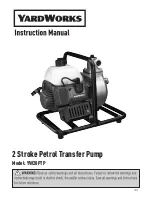
Application notes
PS3031-2440-0000
37
Version: 1.0
4.6
Charging batteries
The power supply can be used to charge lead-acid or maintenance-free batteries. (Two 12 V batteries in
series).
Instructions for charging batteries:
• Adjust the output voltage, measured at no load and at the battery end of the cable, very precisely to the
end-of-charge voltage.
End-of-charge voltage
27.8 V
27.5 V
27.15 V
26.8 V
Battery temperature
10°C
20°C
30°C
40°C
• Use a 50 A or 63 A circuit breaker or a blocking diode between the power supply and the battery.
• Make sure that the output current of the power supply is below the permissible charging current of the
battery.
• Only use matched batteries when connecting 12 V types in series.
• The reverse current to the power supply (battery discharge current) is typically 35 mA when the power
supply is switched off (except when using a blocking diode).
4.7
Series connection
Power supplies of the same type can be connected in series to increase the output voltages. As many
devices can be connected in series as necessary, as long as the sum of the output voltages does not exceed
150 Vdc. Voltages with a potential higher than 60 Vdc are no longer regarded as safety extra-low voltage
and can be dangerous. Such voltages must be protected with a contact hazard protection.
• Grounding of the output is required if the sum of the output voltages is more than 60 Vdc.
• Avoid application of return voltage (e.g., from a braking motor or battery) to the output terminals.
Restrictions:
• Maintain an installation distance of 15 mm (left/right) between two power supplies.
• Do not install the power supplies above each other.
• Power supplies connected in series should only be used in the standard installation position (terminals
on the underside of the device).
• Note that leakage current, electromagnetic interference, input inrush current, and harmonics increase
when using multiple power supplies.
Fig. 27: Series connection








































